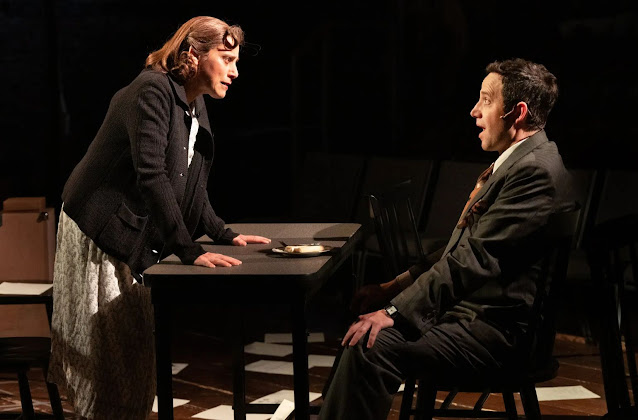 |
| Natalie Gold, Alyssa Emily Marvin, Michael Esper, Sarah Paulson and Corey Stoll in Appropriate. (Photo: Joan Marcus) |
A magnificent cast under Lila Neugebauer’s direction brings Branden Jacobs-Jenkins’s Appropriate to fierce, scrapping life in its Broadway premiere, produced by 2ndStage Theater. The play is the latest entry in the postmodern American family saga sweepstakes, following in the footsteps of such works as Sam Shepard’s Buried Child (1978), Christopher Durang’s The Marriage of Bette and Boo (1985) and Tracy Letts’s August Osage County (2007). These plays scramble the conventions of classic American family plays – and there are dozens of those, all circling around Eugene O’Neill’s Long Day’s Journey into Night – adding elements of satire, parody and knockabout humor as well as anti-realist styles like theatre of the absurd (present in both Buried Child and Bette and Boo) and surrealism. Like Buried Child, Appropriate catapults into surrealism in its final moments, though it also folds in a generous dollop of Southern Gothic. Jacobs-Jenkins has set it on a dilapidated Arkansas plantation after the death of the Lafayette family patriarch, whose three children have gathered on the day of the estate auction. And like Shepard’s play, which it alludes to repeatedly, and also like Bruce Norris’s great Clybourne Park, Appropriate circles around a family secret. The secret isn’t buried in the garden like the corpse of the incest baby in Buried Child or under a tree like the chest belonging to the Korean War vet in Clybourne Park; the Lafayette siblings discover it among their father’s mementos when they clean out the plantation house. It’s a scrapbook of photographs of lynchings that complicates further the legacy of a man who was already difficult in life – irascible, sometimes cruel but also full of contradictions. And at the end of the play we still don’t have a clear picture of him, not just because his children had very different opinions about him but also because the playwright refuses to provide a reliable explanation for the photographs.

